Oldest name of indian people is a Hindu indeed
On

Pro. Rameshwar Mishra Pankaj
The oldest name of the people of Bharatvarsha is Hindu. In the Vedas the word 'Sindhavah' is used in the sense of country. According to Nirukta, the Sakar becomes Hakar. Saraswati is also called Harhavati.
Therefore, 'Sindhavah' will also be called 'Hindavah' i.e. Hindu people. The plural of Hindu is Hindav. This is a Vedic word. Even in Persia, China, Japan, Egypt and Yavana, we were called Indu or Hindu. Aryans cannot be called all the people of India. All Hindus cannot be called Aryans, because Aryan is neither a caste group indicator nor a place indicator. That is a quality indicator word. In the same house, in the same family, one person can be Aryan, the other non-Aryan. It was the resolve and inspiration of our ancestors that all should become Aryans. Which means one should be full of all the best values, full of modesty and morality and have faith in the Vedic religion. One becomes an Aryan only by his qualities and conduct. The entire clan or entire group or community is not AryanIt should happen but it doesn't.
Poor German Christians, in the name of political propaganda, started calling themselves Aryans and indulged in non-Aryan behavior. Then the rest of the fools did even more wonders. He imagined a language and language family and caste called Arya. The strangest cartoons in the world are people who, under the influence of entertaining dogmas like the path of Christ, start doing anything. When the people of Europe developed and became moderate and balanced, they gave the Aryan imagination. Because it has no basis, but till then the Aryan invasion theory was so deeply ingrained in some of our people that they irrationally started calling the Aryans a race and started debating whether the Aryans were native here or came from outside? Arya in Sanskrit means best. Therefore, individuals and groups can become Aryan only through good conduct. It has nothing to do with race or caste.
The word Hindavas, or Sindhavas, is used in most places in the Vedas to denote the country. The 27th mantra of the 24th Sukta of the 8th Mandala of the Rig Veda is -
Ya Rikshadanhaso Muchadyo Varyat Sapta Sindhu I
Vadhardasasya Tuvinrimna Nimnah ll
That is, O Indra, you free us from grave mental sins like that of a bear. That is why we are blessed with happiness and good fortune in this Arya Bhoomi Sapt Sindhu country. May you strike with thunderbolt to kill the evil miscreants and people with non-Aryan behavior. Sapta Sindhu has also appeared at five other places in Rigveda. Similarly, in the Atharvaveda, the second mantra of the second part of the fourth chapter (sixth hymn) is-
Yavati Dyava Prithivi Varimna
Yavat Sapta Sindhvo Vitashthire l
Vacham Vishsya Dushanim,
Tamito Nirvadishma ll
That is, there should be an absence of toxic speech in the entire expanse of this Sapt Sindhu country and in the entire earth and heaven. Speech should be free from poison. Toxic speech should be kept away everywhere. Thus this entire nation has been called Sapt Sindhu.
The Sanskrit 's' becomes 'h' in Prakrit. The word Hindu is the Prakrit form of Sindhu. In the Vedas, according to the rules of Nirukta, Sakara is also pronounced as Hakara. Therefore, 'Sindhavas' will also be pronounced 'Hindavas' and 'Hindavas' This is the law of Nirukta. Thus the word Hindu is Vedic and it is the pronounced form of Indus.
In Parsi language, Sindhu is called Hindu. Saptasindhu is called Haptahindu there. The important thing is that even in Bhavishya Purana, the word 'Haptahindu' has been mentioned in Chapter 5 of Pratisarga Parva.
In Greek language also, 'Ha' disappears and 'Ha' is used for 'S' there too. Thus, in the vast area of ancient Greater India, there is an ancient tradition of speaking and writing 'Hakar' of 'Sakar', that is why it has been mentioned in Nirukta. Thus the word 'Hindu' is Vedic and most sacred. all in the original words have history and culture. Therefore the word Hindu has an integral relationship with the entire culture of India.
Vedas are the origin of religion. The basic presentation of religion is in them. By what name should Indians call their country and society? not from whom, there is no instruction for this in the Vedas.
Instead, the Vedas tell us that there is a part of the divine power in every person. Therefore, individuals and society are entitled to use words appropriately as per the original meaning. Therefore, even if people do not directly understand the word Hindu in the Vedas, they should know that even in such a situation there is no hindrance in using the word Hindu, because only Vedic Sanskrit language is used in the Vedas. At present, other languages than Vedic Sanskrit are used by the residents of India. Prakrit, Apabhramsha and all the languages of present-day India, derived from Sanskrit, are in natural use these days. Therefore, it is natural to use the word 'Hindu' in place of the Vedic words 'Saptasindhavah' and 'Sindhava'.
The basic fact is that according to the Vedic rules themselves, 'Sindhavah' is 'Hindavah' which is the plural of Hindu. Therefore, 'Hindu people' will be considered as a Vedic term only. But just as the national society speaks various languages derived from it in place of Vedic Sanskrit, in the same way they speak the currently prevalent word 'Hindu' for their society, this is also a sufficient basis.
There is one more thing in this context which is completely different. That is, many major societies of the world use such words for themselves, which are not in their original sacred texts. For example, the universally accepted divine book of Islam religion is Quran Sharif. Nowhere in the Quran Sharif has it been said that Allah sent the message of the religion called 'Islam' through the last Prophet. Only religious messages have been given there. His name has not been mentioned separately. Still, people who believe in Quran Sharif and Almighty Allah and the last Prophet call their religion Islam. No one raises this question to them that the religion has not been named Islam in your holy book, then why do you people call your religion Islam and yourselves Muslims? Till just 75 years ago, the people of Europe used to call Islam as Muhammadanism, but now because the people who believe in the religion call their religion Islam, the European people have also started calling their religion Islam.
Similarly, the word 'Momin' is in the Quran for the people who follow that religion, have faith in it and are obedient. them muslims or should we say Muslim, Allah did not send any such message through the last Prophet. Still they call themselves Muslims or Muslims. The Muslim name of that society is natural or universally accepted. Therefore, the name of the society that calls itself Hindu is Hindu. This is also natural and universally accepted.
Similarly, in the New Testament (Bible), the holy book of the Christian people, it is not said anywhere that the people who bring 'Faith' to them will be called 'Christians' or Christians. Yet all those who bring 'Faith' to Jesus call themselves Christians. This is natural and universal.
Therefore, it is natural for Hindus to call themselves Hindus and it is universally accepted.
Other ancient references after the Vedas
The Agama of Rigveda is called Brihaspati Agama. 'Aagam' means behavior-tradition. Which is complementary to Nigam i.e. Shruti tradition. Brihaspati - Agama is considered to be the Agama of Rigveda. The traditionally famous verse of Brihaspati Aagam is-
Himalayam Samarabhya Yavadindu Sarovaram l
Tam Devanirmitam Desham Hindusthanam Prakshate II
From the Himalayas to the Indus Lake. That country created by the gods is called 'Hindustan' . That is, the natural (divinely created) country extending from the Himalayas to the Indus Lake is called Hindustan. Starting from the first letter of the Himalayas 'Hi' and extending to the end of the last word 'Ndu' of the Indus Lake, the country created by the gods is called 'Hindustan'
There is a statement in the ancient scripture called 'Meru Tantra' in which Lord Shiva says to Jagadamba Parvati in the 33rd episode-
Hindudharmapraloptaro Jayante Chakravartinah l
Heenam Cha Dooshayatveva Sa Hinduh Uchyate Priye II
That is, oh dear! In the future, there will be emperors who will destroy Hindu religion i.e. will not protect it as the state religion. The one who considers inferior thoughts, inferior feelings and inferior conduct as impure and rejects them, is a Hindu.
In the first section of Pratisarga Parva of 'Bhavishya Purana' it is said - 'Sapta Hinduryavani Cha'. Hence the word Hindu is used there also. 'The word Hindu is used many times in Bhavishya Purana. The important thing is that both the place Sindhu and the word Hindu have been used in Bhavishya Purana. It is written in section two of Pratisarga Parva of Bhavishya Purana –
Sindhusthanmiti Gyeyam Rashtramaryasya Chottamam l
That is, Sindhu place or Hindu place is the best nation of Aryans. Many Indian kings are described in detail in the Bhavishya Purana itself. In the third section of Pratisarga Parva, the boundaries of Hindustan are described - "Kapilsthan i.e. Ganga Sagar in the east, Bahlika in the west, China country in the north and Setubandh in the south. This area was under the rule of Maharaj Anangpal and under the rule of other Agni dynasty kings. Mlechchha people also followed Aryadharma, due to which Kaliyuga got scared and went to Neelachal mountain.
In the same Purana, in the same section of Pratisarga Parva, it is said that "Shalivahan, the grandson of Chakravarti emperor Vikramaditya, was very famous and he gave harsh punishment to the wicked. And snatched away all their wealth and declared Sindhu place (Hindusthan) as the best place for the Aryans and decided for the Mlechchas to live in the region on the other side of the Indus." It is said in Kalika Purana-
Kalena Balina Nunamdharmakalite Kalau I
Yavanairghormakranta Hindavo Vindhyamavishan ll
That is, when there was a decline in religion due to the influence of the powerful Kali, then Hindu people, moving from the Ganga-Yamuna region, also settled in the Vindhya region. There is clear use of the word Hindu here.
In the 'Adbhuta Kosha' it is written 'Hindu and Hindu are famous and the evil ones are in conflict. That is, 'Hindu is famous for humiliating the wicked. ' Similarly, in the 'Shabda Kalpadrum Kosha' it is 'Heenam dooshayati iti Hinduh' That is, 'He who keeps away from inferior feelings and inferior conduct is a Hindu.
The 'Hemantakavikosha' says: 'A Hindu is a devotee of Narayana and other gods. That is, 'A Hindu is one who is a devotee of Narayana and other gods. The saying of 'Ramkosh' is -
Hindurdushto Na Bhavati Nanaryo Na Vidushakah l
Saddharmapalako Vidwaan Shrautdharmaparayanah ll
The implication is that 'a Hindu is neither evil, nor ignorant nor blasphemous. He who is a follower of the true religion, a scholar and engaged in the Vedic religion is a Hindu.
The definition of a Hindu in the 'Madhavadigvijaya Grantha' is given as follows:
Omkarmoolmantradhyah Punarjanmadridhashyah I
Gobhakto Bharatgururhinduhinsandushakah ll
He is a devotee of cows and a teacher of India and a Hindu who spoils violence That is, a person who considers Omkar as the basic mantra, has a strong belief in reincarnation, is a cow devotee and considers only an Indian as his guru and condemns violence is a Hindu. It is noteworthy that this definition not only includes all Hindus who follow the traditional religion but also Sikhs, Jains, Buddhists and Arya Samaj. This
Thus this is a clear characteristic of a Hindu. The ancient religious scripture of the Zoroastrians is 'Avesta'. The word Hindu is also mentioned in it.
In the second chapter of the book 'Hiuen Tsang's India Journey', Hiuen Tsang has said in the beginning - "The ancient name of India was 'Shinto' and 'Hindo'. But the correct pronunciation is 'Indu'. This pronunciation is beautiful to hear. In Chinese language It means Moon. It is well known that all the living beings continuously revolve around the world cycle in the night of ignorance. They do not have the support of any other star. Only the Moon gives light in that night. Exactly such light is given to the Mahatmas and the holy people. It is of scholars. They show the path to the living beings of the world like the moon. Hence, because of their purity and scholarship, the country of these scholars is called 'Indu'. For this reason in history, people generally call India the country of Brahmins. Whose Meaning is the country of scholars and mahatmas, hence its original name is 'Indu' and we will describe it by the name Indu only. It has sea on three sides and Himalayan mountains in the north. In the east there are valleys and plains which have abundance of water, hence There is a very good yield of fruits, flowers and grains etc. The southern province is full of forests and herbs while the western part is sandy, rocky and barren. This is the general description of this country.
Thus, there are ancient uses of the word Hindu in the scriptures, Tantra texts and Puranas, and also, the ancient use of the word Hindu is found in the scriptures and accounts of the Yavanas and Persians.
लेखक
Related Posts
Latest News
01 Oct 2024 17:59:47
ओ३म 1. सनातन की शक्ति - वेद धर्म, ऋषिधर्म, योग धर्म या यूं कहें कि सनातन धर्म के शाश्वत, वैज्ञानिक,...



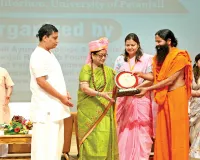
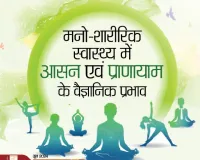

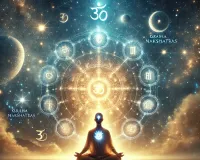
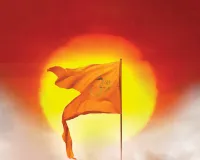

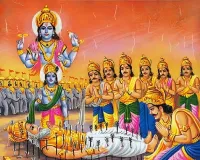



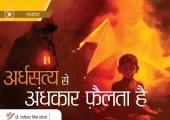


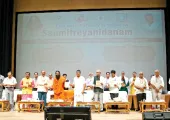

.jpg)
.jpg)
